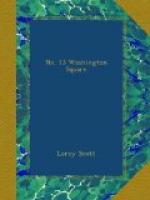Also Mrs. De Peyster was at heart honestly contented. She had spoken truly when she had told Olivetta that Europe was old to her and had become merely a social duty. Of that fatiguing obligation to her position she was glad to be relieved. The past season, with its struggle with Mrs. Allistair and that Duke de Crecy affair, had been a trying one, and she was tired. By the present arrangement, which she regarded as nothing short of an inspiration, her social prestige was secure, her financial difficulties were taken care of, and she herself would have the desired opportunity for a sorely needed rest. She would have her books, she would have the society of Matilda (for Matilda had in the long years grown to be more than a mere servant—she was a companion, a confidant)—her creature comforts would be well seen to by Matilda,—she would have the whole house to roam over at her will during the day, and every night she would have the pleasant relaxation of a drive behind the peerless William.
It seemed to her, as she looked forward to it, the most desirable of vacations.
Her mind was quite at ease concerning Jack. Severity, as she had said, had been necessary. A bit of privation would do him good, would bring him to his senses; she had no slightest doubt of that. And when they met again, he would be in a mood to fit into the place she had carefully prepared for him. Of course, she would let him off in the matter of Ethel Quintard, if he really didn’t care for Ethel. There were other nice girls of good families. She wouldn’t be hard on him.
Also she felt easier in her mind in the matter of the quarrel with Judge Harvey. The sting and humiliation of his words she had now cast out of her system; she was really superior to such criticism. There remained only Judge Harvey’s offense. Certainly he had been inexcusably outspoken and officious. Her resentment had settled down into a calm, implacable, changeless attitude. She would be polite to him, since they must continue to meet in the future. But she would keep him coldly at a distance. She would never unbend. She would never forgive.
Next to the column recording her departure she had noted a few paragraphs giving the progress of the police in their search for James Preston, the forger of the Jefferson letters. What a fool Judge Harvey had been in that affair!...
And yet, in a way, she was sorry. She had liked Judge Harvey; had liked him very much. In fact, there had been relaxed moods in which she had dallied pleasantly with the thought of marrying him. She might, indeed, have married him already had it not been for the obvious social descent.
Also, she thought for a moment of Miss Gardner. In this matter she had likewise been quite right. However, aside from the deception Miss Gardner had practiced, she had seemed a nice girl; and Mrs. De Peyster was lenient enough to feel a very honest wish that the husband, who had so rapidly disappeared, was a decent sort of man. Perhaps later she might favor them with some trifling present.




